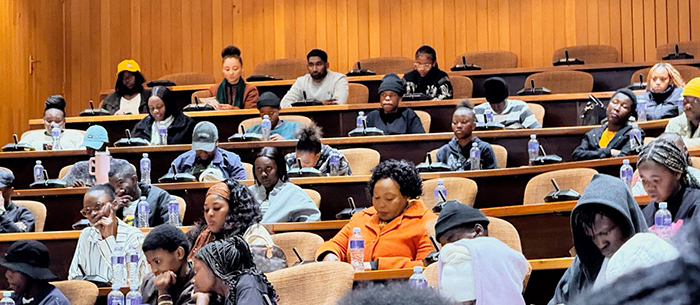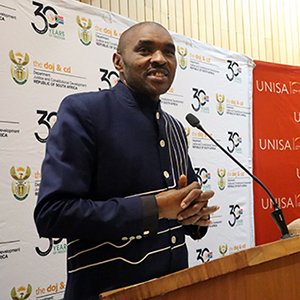
Towards the leading College of Law and Justice in Africa

Some of the youth that participated in the dialogue
As part of Mandela Month, the College of Law, in collaboration with the Department of Justice and Constitutional Development (DOJ&CD), the South African Youth Council (SAYC), Gauteng Legislature and the City of Tshwane (CoT) convened a solution-centred Mandela Day Youth Dialogue on Friday 18 July 2025, at Unisa’s Muckleneuk Campus in Tshwane. The dialogue brought together young people from all walks of life to reflect on the current challenges and opportunities facing today's youth. The theme for the dialogue was Municipal governance, a youth-led path to community participation and inclusive sustainable solutions.
Opening the dialogue and welcoming the delegates, Dr Lindelwa Mhlongo, Manager of Strategic Projects in the College of Law, said, "This event is the result of a partnership between Unisa’s College of Law and the Department of Justice and Constitutional Development. This year, as we reflect on the legacy of the late Nelson Mandela, we are reminded not only of his commitment to justice and human dignity, but also of his firm belief in the role of young people in advancing democracy and social development. Today’s dialogue is grounded in that same belief: that youth are not merely beneficiaries of governance, but key partners in shaping its future. Therefore, young people have a role to play, whether it is through generating ideas, raising concerns or proposing innovative solutions. You can restructure our country to be inclusive, accountable and youth-centred – that values the subsidiarity principle and participation not as a formality, but as a foundation for a resilient and sustainable country."
Advocate Doctor Mashabane, Director-General of the Department of Justice and Constitutional Development, said that with the commemoration of Mandela Day, it was fitting to reflect on Nelson Mandela's conviction that youth are the leaders of tomorrow and vital catalysts for societal transformation. "Madiba," he said, "understood that the inherent energy, idealism and innovative spirit of young people are vital for constructing a just and equitable society. His enduring legacy is a compelling inspiration for developing platforms that seamlessly integrate youth voices into governance structures, particularly at the local level, where their impact can be most direct and tangible."

Councillor Mncedi Ndzwanana, Speaker of the City of Tshwane
He continued: "With the 2026 Municipal Elections on the horizon, this dialogue is critically timed. It marks a critical moment for the democratic transfer of local power. It presents an unparalleled opportunity to put youth in a position to bridge existing engagement gaps and cultivate proactive involvement. Youth voices must shape future local administrations, ensuring that policies and services truly reflect the needs and aspirations of most of our population."
Councillor Mncedi Ndzwanana, Speaker of the City of Tshwane Council, also graced the dialogue. Ndzwanana encouraged the youth to play an active role in strengthening democracy, saying that young people must be active citizens who should come up with innovative ideas and ways of improving the lives of people. He further stated, "Our country has a thriving demography of young people who not only need to be economically empowered, but also desire to participate actively in managing local and national processes, such as elections and other civic engagements. The very core of our democracy calls for engagement embedded in empowerment, meaningful participation, accountability, effectiveness, efficiency and responsiveness."
Other notable speakers at the dialogue included Njabulo Buthelezi of the Public Participation Office in the Gauteng Provincial Legislature; Pule Mmutlana, Divisional Head, Cluster Operations Support, City of Tshwane; Siphelele Ngobese, a researcher in the Inclusive Cities Programme of the South African Cities Network; Dr Paul Mudau, a senior lecturer at the Unisa School of Law; and Mikateko Benedict Phalane, the Tshwane Youth Mayor and the Tshwane Regional Chairperson of the South African Youth Council and Gauteng Youth Advisory Panel.
Among the key issues reflected on during the dialogue were the following:
The day ended with plenary discussions at which young people raised and reflected on pertinent societal issues. Issues raised were GBV, unemployment, youth participation in the economy, crime and other important societal matters.
* By Ngwako Mokgotho, Communication and Marketing Specialist, College of Law
Publish date: 2025-08-14 00:00:00.0